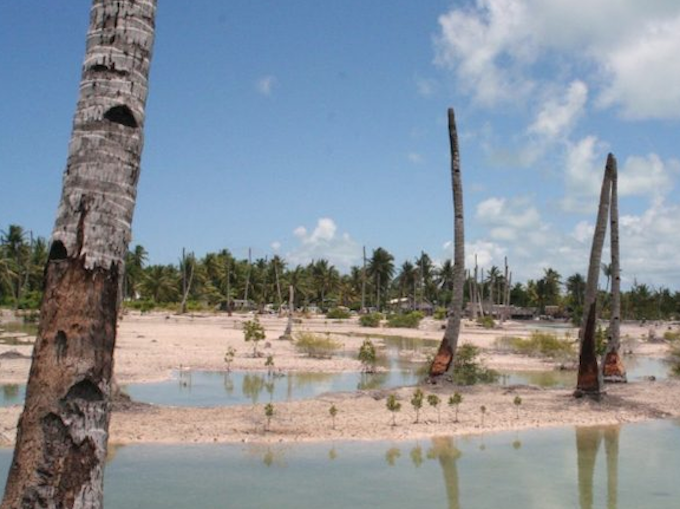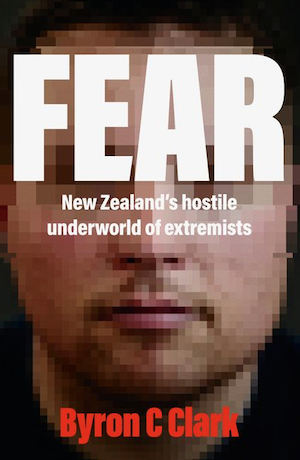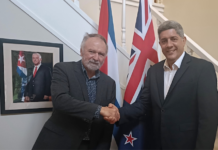
By David Robie
Two researchers examining responses to conspiratorial pandemic narratives have warned Aotearoa New Zealand not to be complacent over the risk of fringe views over climate crisis becoming populist.
Byron C. Clark, a video essayist and author of the recent book Fear: New Zealand’s Hostile Underworld of Extremists, and Emmanuel Stokes, a postgraduate student at the University of Canterbury, argue in a paper in the latest Pacific Journalism Review that policymakers and community stakeholders need to be ready to counter politicised disinformation with a general election looming.
They say that in their case study, Intersections of media influence: Radical conspiracist ‘alt-media’ narratives and the climate crisis in Aotearoa, has demonstrated that “explicit references to US narratives about stolen elections, communist plots and existential dangers to society – many of which bear the hallmarks of American far-right narratives, such as those of the John Birch Society” – are part of the NZ climate discourse.
- READ MORE: Disinformation and climate crisis, governance, training feature in PJR
- Fear: New Zealand’s Hostile Underworld of Extremists
- Russel Norman: Don’t be fooled by NZ greenwashing, the lack of real climate action is dangerous
- Other climate change disinformation

“Tellingly, these were often linked with wider sets of issues into which the climate challenge was crudely bundled,” the authors say.
Their paper argues that “complex matters of national importance , such as climate change or public health emergencies, can be seized upon by alternative media and conspiracist influencers and incorporated onto emotionally potent, reductive stories that are apparently designed to elicit outrage and protest”.
The authors cite examples in the Pacific, saying that they “suspect that a danger exists that . . . the appetite for this kind of storytelling could increase in tandem with growing social disruption caused by the climate crisis, including a large-scale refugee influx on our shores”.
Such a scenario would need to be covered with “a high degree of journalist ethics and professionalism” to prevent “amplifying hateful, dehumanising narratives”.
‘Concerning’ statements
In an interview with Asia Pacific Report, Clark highlighted how various fringe parties in New Zealand were all making “concerning” statements about climate change as the October 14 election drew closer.
“New Conservatives begin their environment policy with ‘There is no climate emergency’. Then they pledge to ‘end all climate focused taxes, subsidies, and regulations’,” he said.
“DemocracyNZ wants to repeal the Climate Change Response Act and veto any new taxes on farming. Elsewhere in their policy they appear to downplay the impact of methane (Aotearoa’s largest source of emissions),” Clark said.
The FreedomsNZ party had not yet released detailed policy but promised to “end climate change overreach”.
Clark found the comments from DemocracyNZ on methane particularly interesting as Groundswell recently sponsored a tour by American scientist Dr Tom Sheahen, who — in contrast to the scientific consensus on climate change — made the claim that methane was an “irrelevant” greenhouse gas.
Dr Sheahen also appeared on the Reality Check Radio show Greenwashed, hosted by former Federated Farmers president Don Nicholson and Jaspreet Boparai, a dairy farmer and member of Voices for Freedom, who was last year elected to the Southland District Council.
“Greenwashed is the kind of alt-media that could influence how people vote,” Clark said.
“While none of these parties I’ve mentioned are likely to get into Parliament, if they get, say, 50,000 votes between them, more mainstream parties could look at how they could appeal to the same constituency in the future, as 1 percent of the vote can be the difference between being in government and being in opposition.
Mainstreaming of misinformation
“That could lead to the mainstreaming of misinformation about climate change.”
However, Clark believes Pacific nations are “less susceptible to climate change disinformation as they’re experiencing the direct effects of climate change.
“In Aotearoa, many people remain insulated from it (notwithstanding events like Cyclone Gabrielle) and many people’s livelihoods, as well as the economies of some regions, are dependent on activity that contributes to the greenhouse effect (such as dairy farming) which makes downplaying the significance of the crisis appealing.”
But Clark admits that misinformation about covid and the vaccine has spread in the Pacific. Also competition between large powers in the region – such as China and the US — could lead to more disinformation targeting the Pacific, potentially including climate change disinformation.
I think Pacific nations are less susceptible to climate change disinformation as they are experiencing the direct effects of climate change, while in Aotearoa many people remain insulated from it (notwithstanding events like Cyclone Gabrielle) and many people’s livelihoods, as well as the economies of some regions, are dependent on activity that contributes to the greenhouse effect (such as dairy farming) which makes downplaying the significance of the crisis appealing.
Targeting the Pacific
However, misinformation about covid and the vaccine has spread in the Pacific, and competition between large powers in the region (the US and China for example) could lead to more disinformation targeting the Pacific, potentially including climate change disinformation.
In his book Fear, Clark devoted two out of the 23 chapters — “The Fox News of the Pasifika community” and “Counterspin Media” — to examining the impact of misinformation on the Pasifika community in Aotearoa.
APNA Television cancelled the Pacific Fox News-style programme Talanoa Sa’o, although the show is still recorded and uploaded to YouTube.
“Its reach appears to be smaller than it was. Counterspin Media also looks to have a declining reach. The show originally aired on GTV, a network operated by the dissident Chinese billionaire Guo Wengui and former Trump advisor Steve Bannon.
“While there has not been any explicit evidence to suggest that Guo or his businesses were funding Counterspin, they have appeared to be struggling since Guo filed for bankruptcy, having to find a new studio.
Are there any new trends — especially impacting on the Pacific communities, or perceptions of them?
“The biggest chance in the disinformation landscape since I wrote Fear has been the arrival of Reality Check Radio, which produces 9 hours a day of content on weekdays (unlike Talanoa Sa’o or Counterspin Media, which would produce an hour or two a week).
“None of their content is designed to appeal in particular to a Pacific audience, however.
“Another development is organisations like Family First and some evangelical churches campaigning against LGBT+ rights and sex education in schools, with the New Conservatives continuing to campaign on these same issues.”
Affecting democracy
Clark remains convinced that mis- and disinformation are going to continue to be an issue affecting New Zealand’s democracy.
“The networks established during the pandemic remain and are starting to pivot from covid and vaccine mandates to other issues — climate change being a significant one, but also co-governance and LGBT+ rights,” he said.
“This means journalism will be increasingly important.”
In a separate paper in Pacific Journalism Review, the journal editor, Dr Philip Cass, examines the impact of conspiracy theories on Pacific churches and community information channels, drawing a contrast between evangelical/Pentecostal and mainstream religious institutions.
He said that “in spite of the controversial behaviour of [Destiny Church’s] ‘Bishop’ Brian Tamaki, most mainstream Pacific churches were highly alert to the reality of the virus and supportive of their communities”.
Dr Cass called for further research such as an online study in Pacific languages to gauge any difference between diasporic sources and home island sources, and a longitudinal study to indicate whether anti-vaccination and conspiracy theory messages have changed — and in what way — since 2020.
Dr David Robie is an editor of PJR and convenor of Pacific Media Watch.











































